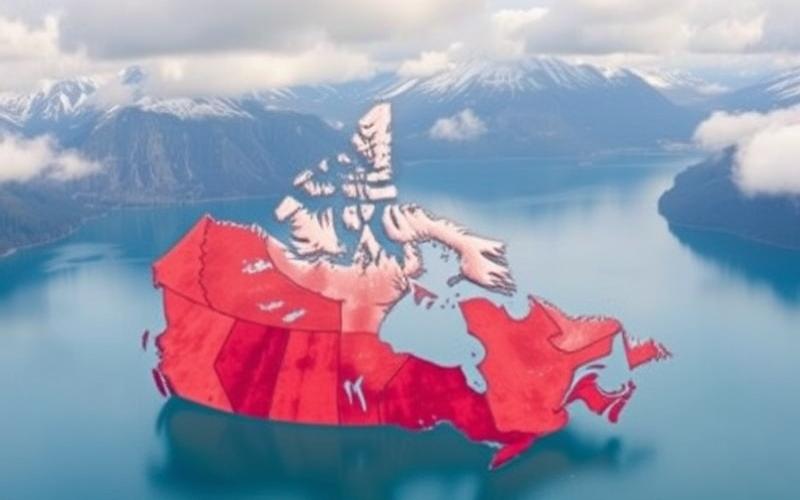
 Published on and written by Cyril Jarnias
Published on and written by Cyril Jarnias
Canadian real estate attracts numerous foreign investors due to its economic stability and dynamic property market. However, before diving into property acquisition in Canada, it’s crucial to understand the applicable laws and regulations. This article will guide you through the essential aspects of the Canadian real estate legal framework.
Welcome Foreign Investors: An Open and Accessible Market
Canada offers a favorable environment for foreign investors in the real estate sector. Unlike some countries that impose strict restrictions, Canada generally allows foreigners to acquire real estate properties without major obstacles. This openness applies to most property types, whether primary residences, rental properties, or commercial real estate.
However, it’s important to note some nuances:
- Some provinces, like Ontario and British Columbia, have introduced additional taxes for foreign buyers to regulate local real estate markets.
- Restrictions may apply to purchasing agricultural land in certain provinces, such as Quebec and Alberta, where special permits may be required.
- For properties located near borders or in areas considered strategic, additional checks may be necessary.
Despite these particularities, Canada remains overall a welcoming country for foreign real estate investors, offering numerous opportunities in a diverse and dynamic market.
Canadian Real Estate Legal Framework: What You Need to Know
The Canadian legal system, based on common law (except in Quebec which follows civil law), provides a solid framework for real estate transactions. Here are the main laws and regulations to know:
- Immigration and Refugee Protection Act: While not directly concerning real estate, this law may affect non-residents’ ability to stay in Canada and therefore manage their real estate investments.
- Provincial real estate laws: Each province has its own laws governing real estate transactions, property rights, and owner obligations. For example, in Ontario, the Land Titles Act regulates the property title registration system.
- Municipal regulations: Cities and municipalities have their own regulations concerning zoning, building permits, and construction standards. It’s crucial to know them before undertaking any real estate project.
- Environmental Assessment Act: This federal law may apply to certain large-scale real estate projects, requiring an assessment of their environmental impact.
- Privacy Protection Act: It applies to the collection, use, and disclosure of personal information in real estate transactions.
These laws form a complex but comprehensive framework, aiming to protect both buyers, sellers, and public interest in real estate transactions.
Real Estate Taxation in Canada: An Essential Aspect for Investors
Taxation is a crucial element to consider when making any real estate investment in Canada. The Canadian tax system includes several levels of taxation that can affect property owners:
- Income tax: Rental income is taxable in Canada, whether the owner is a resident or not. Non-residents are generally subject to a 25% withholding tax on gross rents, unless they choose to file a Canadian income tax return.
- Property tax: This annual tax is collected by municipalities and varies according to property value and location.
- Land transfer tax: Also known as “property transfer tax,” this tax is due when purchasing a property. Its rate varies by province and municipality.
- Foreign buyer tax: Some provinces, like Ontario and British Columbia, have introduced an additional tax for foreign buyers, which can reach up to 20% of the property value in certain regions.
- Capital gains tax: When selling a property, 50% of capital gains are taxable. For non-residents, a 25% withholding tax on the sale price is generally applied, unless special authorization is obtained from the Canada Revenue Agency.
It’s important to note that tax treaties between Canada and other countries may affect how these taxes apply to foreign investors. Consultation with a local tax expert is strongly recommended to optimize your tax strategy.
Property Owner Rights and Responsibilities in Canada: What You Need to Know
Being a property owner in Canada comes with significant rights, but also important responsibilities. Here’s an overview of the main aspects to know:
- Right of enjoyment: Owners have the right to use, rent, or sell their property as they see fit, within the limits of local laws and regulations.
- Protection against expropriation: Although rare, expropriation is possible in Canada for projects of public interest, but it must be accompanied by fair compensation.
- Maintenance responsibilities: Owners are required to maintain their property in good condition, in accordance with local health and safety standards.
- Obligations towards tenants: For rental properties, owners must respect provincial residential tenancy laws, which generally strongly protect tenant rights.
- Compliance with municipal regulations: Owners must comply with local regulations concerning noise, property maintenance, snow removal, etc.
It’s crucial to fully understand these rights and responsibilities to avoid any disputes and ensure harmonious management of your real estate investment in Canada.
Recent Regulatory Developments: Stay Informed to Invest Better
The regulatory landscape of Canadian real estate is constantly evolving. Here are some recent changes and trends to watch:
- Strengthened anti-money laundering rules: The Canadian government has reinforced reporting requirements for real estate transactions to combat money laundering.
- New restrictions on short-term rentals: Several major cities have introduced stricter regulations for Airbnb-type rentals, potentially affecting rental investment strategies.
- Housing affordability measures: Faced with rising real estate prices, some provinces have implemented measures aimed at improving housing affordability, which could influence market dynamics.
- Focus on energy efficiency: New construction and renovation standards emphasize energy efficiency, which could affect construction and renovation costs.
- Debate on vacant home taxes: Some cities are considering or have already implemented taxes on vacant homes to encourage property occupancy.
These developments highlight the importance for investors to stay informed and adapt to regulatory changes to optimize their real estate investments in Canada.
Good to Know:
The Canadian real estate market is dynamic and offers numerous opportunities, but it’s essential to fully understand the legal and tax framework before investing. Thorough due diligence and consultation with local experts are highly recommended to successfully navigate this complex environment.
Disclaimer: The information provided on this website is for informational purposes only and does not constitute financial, legal, or professional advice. We encourage you to consult qualified experts before making any investment, real estate, or expatriation decisions. Although we strive to maintain up-to-date and accurate information, we do not guarantee the completeness, accuracy, or timeliness of the proposed content. As investment and expatriation involve risks, we disclaim any liability for potential losses or damages arising from the use of this site. Your use of this site confirms your acceptance of these terms and your understanding of the associated risks.



















